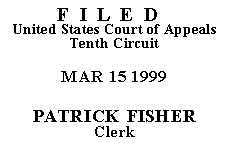

| SCOTT LEE FEVER, | |
| Plaintiff-Appellant, | |
| v. | |
| J.W. BOOKER, Warden, United States Penitentiary, Leavenworth; (NFN) APPLE, Associate Warden; TORIX, Unit Manager; (NFN) SWANSON, Counselor; PHILLIP K. HILL, MD; LUZ BATTISTA, MD; JUDITH THARP, MD; (NFN) DONAVAN, PHD; (NFN) SHEPPARD, HSA; (NFN) TODD, ASHA; (NFN) STOWERS, PA; (NFN) CAMPS, PA; (NFN) ACOSTA, PA; (NFN) HERNANDEZ, PA; (NFN) BERHARE, PA; (NFN) NAVARRO, PA; (NFN) CORRAL, PA; JOHN DOES; and several unknown Bureau of Prisons staff members in their individual capacity as defendants, | |
| Defendants-Appellees. |
Plaintiff Scott Lee Fever, proceeding pro se and in forma pauperis, appeals the district court's dismissal of his civil rights action without prejudice for failure to exhaust administrative remedies. Plaintiff, currently incarcerated in the United States Penitentiary in Leavenworth, Kansas, brought this action pursuant to Bivens v. Six Unknown Named Agents of Fed. Bureau of Narcotics, 403 U.S. 388 (1971). He alleged that he had been denied adequate medical care for his Crohn's disease in violation of the Eighth Amendment, had been denied religious freedom and had suffered retaliatory action in violation of the First Amendment, and had been subjected to conditions which were not compatible with his physical status in violation of the Americans with Disabilities Act. He sought both injunctive relief and money damages from the prison warden, the associate warden, and numerous counselors, doctors, physician assistants, and other medical and prison personnel. The district court dismissed the complaint without prejudice because it found that Plaintiff had failed to exhaust available administrative remedies as required by 42 U.S.C. § 1997e(a). We exercise jurisdiction pursuant to 28 U.S.C. § 1291.
On appeal, Plaintiff claims that, in light of our decision in Garrett v. Hawk, 127 F.3d 1263 (10th Cir. 1997), he need not exhaust administrative remedies because he sought money damages. He also lists several specific grievances that he allegedly filed and contends that no other administrative grievance procedures are available to him because the medical and administrative staff of the prison have blocked them. Finally, Plaintiff requests that he be granted a "change of venue." Appellant's Br. at 4. We review de novo the district court's dismissal pursuant to section 1997e(a) for failure to exhaust administrative remedies. See Garrett, 127 F.3d at 1264.
Because Plaintiff filed his complaint on July 10, 1998, it is governed by the requirements of 42 U.S.C. § 1997e(a), as amended by the Prison Litigation Reform Act of 1995, Pub. L. No. 104-134, § 803, 110 Stat. 1321 (Apr. 26, 1996). The statute provides that "[n]o action shall be brought with respect to prison conditions under section 1983 . . . , or any other Federal law, by a prisoner . . . until such administrative remedies as are available are exhausted." 42 U.S.C. § 1997e(a). In Garrett, we held that this exhaustion requirement is generally mandatory. See Garrett, 127 F.3d at 1265. We also determined, however, that prisoners who file Bivens claims for monetary damages against prison officials were not required to exhaust administrative remedies under the PLRA "because no such remedies exist to be exhausted." Id. at 1267. But see Alexander v. Hawk, 159 F.3d 1321, 1328 (11th Cir. 1998) (holding that prisoner seeking injunctive and monetary relief is required to comply with the PLRA's mandatory exhaustion requirement).
In this case, the district court did not distinguish between Plaintiff's monetary and injunctive claims. Applying the principle in Garrett set forth above, we conclude that the district court erred in dismissing the Bivens claim for monetary damages. Accordingly, we reverse the dismissal without prejudice of Plaintiff's claim for monetary damages. See Florence v. Booker, 161 F.3d 17, 1998 WL 694521 (10th Cir. 1998) (Table).
With respect to Plaintiff's claim for injunctive relief, administrative remedies are available to him. See 28 C.F.R. § 542 (1998). On appeal, Plaintiff explains that he has filed various administrative grievances. Because Plaintiff sets forth these specific grievance filings for the first time on appeal, and because the district court has not assessed whether these alleged grievance filings satisfy the exhaustion requirement, we cannot determine whether the court's dismissal for failure to exhaust was proper. Accordingly, we reverse the dismissal of the claims for injunctive relief and remand so that the district court may assess whether the alleged grievance filings satisfy the exhaustion requirement.
In sum, we REVERSE the dismissals without prejudice of Plaintiff's claims for monetary damages and injunctive relief and REMAND for further proceedings consistent with this Order. We also deny Plaintiff's request for a change of venue.
REVERSED and REMANDED.
Entered for the Court
Monroe G. McKay
Circuit Judge
*. This order and judgment is not binding precedent, except under the doctrines of law of the case, res judicata, and collateral estoppel. The court generally disfavors the citation of orders and judgments; nevertheless, an order and judgment may be cited under the terms and conditions of 10th Cir. R. 36.3.